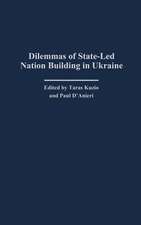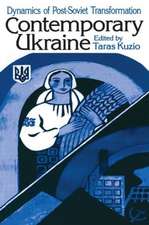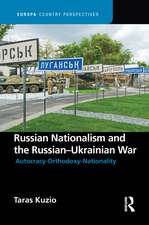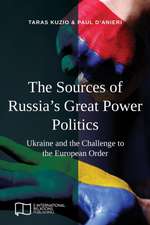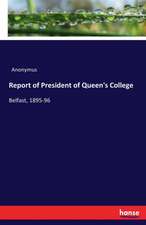Ukraine: Democratization, Corruption, and the New Russian Imperialism: Praeger Security International
Autor Taras Kuzioen Limba Engleză Hardback – 22 iun 2015 – vârsta până la 17 ani
Ukraine dominated international headlines as the Euromaidan protests engulfed Ukraine in 2013-2014 and Russia invaded the Crimea and the Donbas, igniting a new Cold War. Written from an insider's perspective by the leading expert on Ukraine, this book analyzes key domestic and external developments and provides an understanding as to why the nation's future is central to European security. In contrast with traditional books that survey a millennium of Ukrainian history, author Taras Kuzio provides a contemporary perspective that integrates the late Soviet and post-Soviet eras.
The book begins in 1953 when Soviet leader Joseph Stalin died during the Cold War and carries the story to the present day, showing the roots of a complicated transition from communism and the weight of history on its relations with Russia. It then goes on to examine in depth key aspects of Soviet and post-Soviet Ukrainian politics; the drive to independence, Orange Revolution, and Euromaidan protests; national identity; regionalism and separatism; economics; oligarchs; rule of law and corruption; and foreign and military policies.
Moving away from a traditional dichotomy of "good pro-Western" and "bad pro-Russian" politicians, this volume presents an original framework for understanding Ukraine's history as a series of historic cycles that represent a competition between mutually exclusive and multiple identities. Regionally diverse contemporary Ukraine is an outgrowth of multiple historical Austrian-Hungarian, Polish, Russian, and especially Soviet legacies, and the book succinctly integrates these influences with post-Soviet Ukraine, determining the manner in which political and business elites and everyday Ukrainians think, act, operate, and relate to the outside world.
| Toate formatele și edițiile | Preț | Express |
|---|---|---|
| Paperback (1) | 370.34 lei 3-5 săpt. | +17.42 lei 5-11 zile |
| Taylor & Francis – 13 iul 2016 | 370.34 lei 3-5 săpt. | +17.42 lei 5-11 zile |
| Hardback (2) | 422.93 lei 6-8 săpt. | |
| Bloomsbury Publishing – 22 iun 2015 | 422.93 lei 6-8 săpt. | |
| Taylor & Francis – 30 apr 1998 | 1276.49 lei 6-8 săpt. |
Din seria Praeger Security International
- 18%
 Preț: 334.19 lei
Preț: 334.19 lei - 8%
 Preț: 335.53 lei
Preț: 335.53 lei - 34%
 Preț: 376.10 lei
Preț: 376.10 lei - 46%
 Preț: 443.64 lei
Preț: 443.64 lei - 29%
 Preț: 240.11 lei
Preț: 240.11 lei - 8%
 Preț: 304.56 lei
Preț: 304.56 lei - 34%
 Preț: 373.82 lei
Preț: 373.82 lei - 19%
 Preț: 412.79 lei
Preț: 412.79 lei - 19%
 Preț: 338.42 lei
Preț: 338.42 lei - 18%
 Preț: 335.62 lei
Preț: 335.62 lei - 27%
 Preț: 377.35 lei
Preț: 377.35 lei - 27%
 Preț: 376.75 lei
Preț: 376.75 lei - 18%
 Preț: 336.46 lei
Preț: 336.46 lei - 18%
 Preț: 321.73 lei
Preț: 321.73 lei - 27%
 Preț: 384.51 lei
Preț: 384.51 lei - 18%
 Preț: 320.50 lei
Preț: 320.50 lei - 18%
 Preț: 320.50 lei
Preț: 320.50 lei - 18%
 Preț: 321.35 lei
Preț: 321.35 lei - 24%
 Preț: 420.54 lei
Preț: 420.54 lei - 14%
 Preț: 335.99 lei
Preț: 335.99 lei - 18%
 Preț: 355.82 lei
Preț: 355.82 lei - 18%
 Preț: 319.83 lei
Preț: 319.83 lei - 18%
 Preț: 334.28 lei
Preț: 334.28 lei - 32%
 Preț: 354.48 lei
Preț: 354.48 lei - 14%
 Preț: 335.14 lei
Preț: 335.14 lei - 38%
 Preț: 405.98 lei
Preț: 405.98 lei - 40%
 Preț: 571.34 lei
Preț: 571.34 lei - 18%
 Preț: 321.85 lei
Preț: 321.85 lei - 18%
 Preț: 323.25 lei
Preț: 323.25 lei - 18%
 Preț: 253.28 lei
Preț: 253.28 lei - 40%
 Preț: 571.50 lei
Preț: 571.50 lei - 14%
 Preț: 333.72 lei
Preț: 333.72 lei - 18%
 Preț: 301.73 lei
Preț: 301.73 lei - 19%
 Preț: 352.96 lei
Preț: 352.96 lei - 26%
 Preț: 387.80 lei
Preț: 387.80 lei - 18%
 Preț: 302.77 lei
Preț: 302.77 lei - 14%
 Preț: 333.91 lei
Preț: 333.91 lei - 17%
 Preț: 325.80 lei
Preț: 325.80 lei - 24%
 Preț: 338.58 lei
Preț: 338.58 lei - 34%
 Preț: 414.73 lei
Preț: 414.73 lei - 18%
 Preț: 354.30 lei
Preț: 354.30 lei - 29%
 Preț: 254.29 lei
Preț: 254.29 lei - 18%
 Preț: 354.11 lei
Preț: 354.11 lei - 18%
 Preț: 334.38 lei
Preț: 334.38 lei - 14%
 Preț: 302.68 lei
Preț: 302.68 lei - 18%
 Preț: 322.97 lei
Preț: 322.97 lei - 27%
 Preț: 376.50 lei
Preț: 376.50 lei - 27%
 Preț: 322.81 lei
Preț: 322.81 lei - 27%
 Preț: 382.91 lei
Preț: 382.91 lei - 18%
 Preț: 320.87 lei
Preț: 320.87 lei
Preț: 422.93 lei
Preț vechi: 637.70 lei
-34% Nou
80.94€ • 84.19$ • 66.82£
Carte tipărită la comandă
Livrare economică 14-28 aprilie
Specificații
ISBN-10: 1440835020
Pagini: 640
Ilustrații: 62 bw illus
Dimensiuni: 156 x 235 x 36 mm
Greutate: 1.02 kg
Editura: Bloomsbury Publishing
Colecția Praeger
Seriile Praeger Security International, Cărțile Sidoniei Bogdan
Locul publicării:New York, United States
Caracteristici
Notă biografică
Recenzii
Descriere
Ukraine dominated international headlines as the Euromaidan protests engulfed Ukraine in 2013-2014 and Russia invaded the Crimea and the Donbas, igniting a new Cold War. Written from an insider's perspective by the leading expert on Ukraine, this book analyzes key domestic and external developments and provides an understanding as to why the nation's future is central to European security. In contrast with traditional books that survey a millennium of Ukrainian history, author Taras Kuzio provides a contemporary perspective that integrates the late Soviet and post-Soviet eras.
The book begins in 1953 when Soviet leader Joseph Stalin died during the Cold War and carries the story to the present day, showing the roots of a complicated transition from communism and the weight of history on its relations with Russia. It then goes on to examine in depth key aspects of Soviet and post-Soviet Ukrainian politics; the drive to independence, Orange Revolution, and Euromaidan protests; national identity; regionalism and separatism; economics; oligarchs; rule of law and corruption; and foreign and military policies.
Moving away from a traditional dichotomy of "good pro-Western" and "bad pro-Russian" politicians, this volume presents an original framework for understanding Ukraine's history as a series of historic cycles that represent a competition between mutually exclusive and multiple identities. Regionally diverse contemporary Ukraine is an outgrowth of multiple historical Austrian-Hungarian, Polish, Russian, and especially Soviet legacies, and the book succinctly integrates these influences with post-Soviet Ukraine, determining the manner in which political and business elites and everyday Ukrainians think, act, operate, and relate to the outside world.


